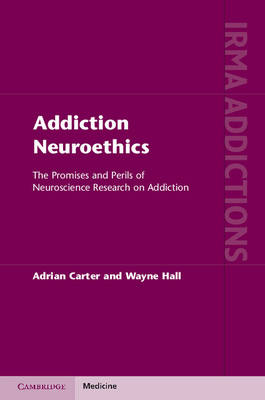
Addiction Neuroethics
Cambridge University Press (Verlag)
978-1-107-00324-8 (ISBN)
Addiction is a significant health and social problem and one of the largest preventable causes of disease globally. Neuroscience promises to revolutionise our ability to treat addiction, lead to recognition of addiction as a 'real' disorder in need of medical treatment and thereby reduce stigma and discrimination. However, neuroscience raises numerous social and ethical challenges: • If addicted individuals are suffering from a brain disease that drives them to drug use, should we mandate treatment? • Does addiction impair an individual's ability to consent to research or treatment? • How will neuroscience affect social policies towards drug use? Addiction Neuroethics addresses these challenges by examining ethical implications of emerging neurobiological treatments, including: novel psychopharmacology, neurosurgery, drug vaccines to prevent relapse, and genetic screening to identify individuals who are vulnerable to addiction. Essential reading for academics, clinicians, researchers and policy-makers in the fields of addiction, mental health and public policy.
Adrian Carter is NHMRC Postdoctoral Fellow, Addiction Neuroethics Unit, University of Queensland Centre for Clinical Research, Brisbane, Australia. Wayne Hall is NHMRC Australia Fellow, Addiction Neuroethics Unit, University of Queensland Centre for Clinical Research, and Queensland Brain Institute, Brisbane, Australia.
Preface; 1. Introduction; 2. What is addiction?; 3. The neurobiology of addiction; 4. Neurobiological treatments of addiction; 5. Autonomy, addiction and the public good; 6. Autonomy and the capacity to consent to addiction treatment; 7. The rights of individuals treated for drug, alcohol and tobacco addiction; 8. Coerced treatment of addiction; 9. Ethics of addiction research; 10. New developments in the treatment of addiction; 11. In search of a neurobiological 'cure' of addiction; 12. Preventing addiction and personalised addiction treatment; 13. Feeling 'better than well'; 14. The implications of addiction neurobiology for public policy; 15. Concluding remarks; Index.
| Reihe/Serie | International Research Monographs in the Addictions |
|---|---|
| Zusatzinfo | 2 Halftones, unspecified; 8 Line drawings, unspecified |
| Verlagsort | Cambridge |
| Sprache | englisch |
| Maße | 155 x 235 mm |
| Gewicht | 700 g |
| Themenwelt | Geisteswissenschaften ► Psychologie ► Klinische Psychologie |
| Medizin / Pharmazie ► Medizinische Fachgebiete ► Neurologie | |
| Medizin / Pharmazie ► Medizinische Fachgebiete ► Psychiatrie / Psychotherapie | |
| Medizin / Pharmazie ► Medizinische Fachgebiete ► Suchtkrankheiten | |
| ISBN-10 | 1-107-00324-5 / 1107003245 |
| ISBN-13 | 978-1-107-00324-8 / 9781107003248 |
| Zustand | Neuware |
| Haben Sie eine Frage zum Produkt? |
aus dem Bereich


